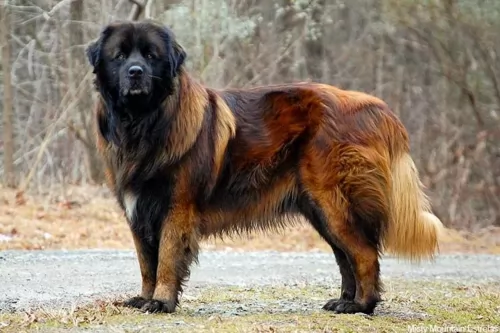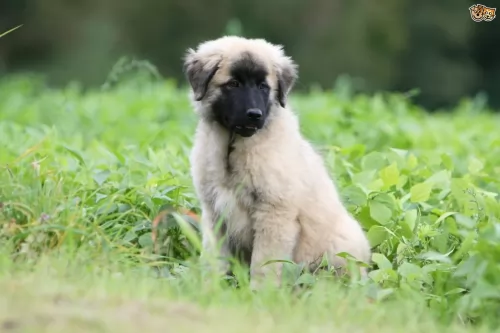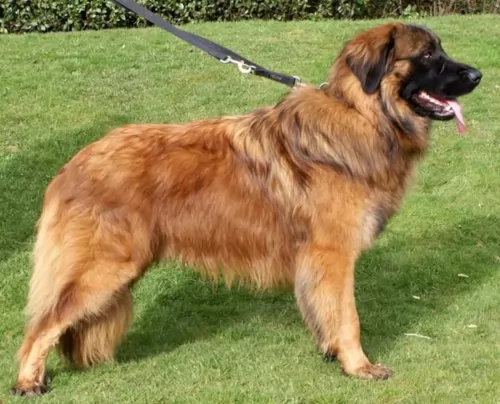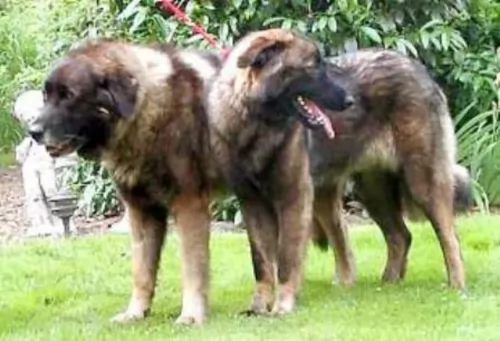 Petzlover
Petzlover Estrela Mountain Dog is originated from Portugal but Tibetan Mastiff is originated from China. Estrela Mountain Dog may grow 11 cm / 4 inches shorter than Tibetan Mastiff. Estrela Mountain Dog may weigh 40 kg / 88 pounds lesser than Tibetan Mastiff. Both Estrela Mountain Dog and Tibetan Mastiff has almost same life span. Both Estrela Mountain Dog and Tibetan Mastiff has almost same litter size. Both Estrela Mountain Dog and Tibetan Mastiff requires Moderate Maintenance.
Estrela Mountain Dog is originated from Portugal but Tibetan Mastiff is originated from China. Estrela Mountain Dog may grow 11 cm / 4 inches shorter than Tibetan Mastiff. Estrela Mountain Dog may weigh 40 kg / 88 pounds lesser than Tibetan Mastiff. Both Estrela Mountain Dog and Tibetan Mastiff has almost same life span. Both Estrela Mountain Dog and Tibetan Mastiff has almost same litter size. Both Estrela Mountain Dog and Tibetan Mastiff requires Moderate Maintenance.
 Also known as the Cao da Serra de Estrela, the large Estrela Mountain Dog from Portugal is an ancient breed, having been used for centuries to guard homesteads and livestock.
Also known as the Cao da Serra de Estrela, the large Estrela Mountain Dog from Portugal is an ancient breed, having been used for centuries to guard homesteads and livestock.
The Estrela, as a herding dog, has been developed over a long period of time because shepherds particularly wanted a dog that could survive in the mountains and be strong enough to guard livestock from predators.
The first official recorded breed standard was published in 1933, with an attempt to make the Estrela a distinct breed with a hooked tail and double dew claws.
Today the Estrela is a dog which can be found in other countries beyond Portugal, and in fact in 1973 pairs of the dogs were imported to the United States.
 The Tibetan Mastiff is still considered to be a primitive breed originating in Tibet centuries ago. The breed was developed to guard property and livestock. They still do this as well as being a much loved family dog and a show dog as well. There is very little history that is documented for the breed prior to the 19th century.
The Tibetan Mastiff is still considered to be a primitive breed originating in Tibet centuries ago. The breed was developed to guard property and livestock. They still do this as well as being a much loved family dog and a show dog as well. There is very little history that is documented for the breed prior to the 19th century.
Believed to be centuries old with ancestors who are mastiff like dogs that developed into two different types of Tibetan Mastiffs. These types are the Tsang-Khyi and the Do-Khyi. The Tsang Khyi were guardians for Tibetan monks, while the Tsang-Khyi guarded flocks for nomadic shepherds and in villages.
The first Tibetan Mastiff was imported in 1847 to England and presented as a gift to Wueen Victoria, from India’s Viceroy. By 1873 there was an English Kennel Club and the breed was labeled a large dog from Tibet and entered into the EKC Stud Book.
The next year the future King Edward VII, brought another two Tibetan Mastiffs to the United Kingdom to show in 1875. The first breed club began in 1931. The world wars interfered and no new dogs were imported to England until 1976. Two dogs were given to the President of the United States in the late 1950’sbut were not bred and it wasn’t until 1970 that any more were imported. The US Tibetan Mastiff Club was not founded until 1974 and they were first entered in a National Specialty show in 1979.
In 2007 the AKC recognized the breed as a working dog since 2007. It’s hard to find a purebred Tibetan Mastiff in Tibet anymore.
 The large Estrela Mountain Dog stands between 62 and 72cm and weighs between 30kg and 50kg.
The large Estrela Mountain Dog stands between 62 and 72cm and weighs between 30kg and 50kg.
The dog has 2 coat types – short and long but always coarse and thick. The coat is available in a number of colors, from fawn to gray to yellow and brindle and there can be white and black mixed throughout the coat.
The head of the dog is large and long, the neck fairly short and thick, he has dark brown eyes, a bright, intelligent expression with small, floppy ears which are set high on the skull, falling backwards against the side of the head. The tail is long and thick and the dog has a deep chest.
A large, athletic dog, the Estrela Mountain Dog is actually a calm dog, while still being protective towards his human family.
He is an intelligent dog who responds well to training and socialization. He is an independent dog, so this training and socialization is important - will be good for him, turning him into an obedient, relaxed pet who gets on well with other pets in the home as well as with children.
 Both types of Mastiffs can be present in the same litter, so that both larger and smaller pups are present. Both types are well-muscled and structured. Today’s dogs being developed in China and the West are much larger than the previous ones. These dogs would be less useful to the nomads and cost too much to feed. Today’s dog is very large with a large head and a long double coat. This coat can be black, brown, gold, and blue, with or without tan markings. There are now a few white Tibetan Mastiffs being bread.
Both types of Mastiffs can be present in the same litter, so that both larger and smaller pups are present. Both types are well-muscled and structured. Today’s dogs being developed in China and the West are much larger than the previous ones. These dogs would be less useful to the nomads and cost too much to feed. Today’s dog is very large with a large head and a long double coat. This coat can be black, brown, gold, and blue, with or without tan markings. There are now a few white Tibetan Mastiffs being bread.
The breed standard for the Mastiff is different in the West than in the East. In the East the breed is broken into two categories – the Lion Head and the Tiger head.
 The Estrela Mountain Dog loves his human family and takes guarding them and protecting them seriously. He is a strong willed, independent dog that will require training and socialization. He makes an excellent pet, and is calm and gentle with children.
The Estrela Mountain Dog loves his human family and takes guarding them and protecting them seriously. He is a strong willed, independent dog that will require training and socialization. He makes an excellent pet, and is calm and gentle with children.
The Estrela Mountain Dog has so much going for him – he is beautiful to look at, he is loyal and protective with his human family, he is intelligent, loving and a healthy type of breed, and he is just waiting to become a member of your family.
 The Estrela Mountain Dog can live to be between 10 and 14 years of age, but as with any large dog, he will have a tendency to suffer from hip- and elbow dysplasia.
The Estrela Mountain Dog can live to be between 10 and 14 years of age, but as with any large dog, he will have a tendency to suffer from hip- and elbow dysplasia.
Dilated cardiomyopathy is another common heart failure disease found particularly in large-breed dogs. The Estrela is prone to this disease and you’ll notice he has shortness of breath, abdominal swelling and coughing. The disease may not be curable, but there are certainly treatments for it.
 Though considered a primitive dog and isolated for several centuries, so they should not have as many genetic or inherited conditions as other dogs with more cross and in-breeding. These are the potential health issues they might develop:
Though considered a primitive dog and isolated for several centuries, so they should not have as many genetic or inherited conditions as other dogs with more cross and in-breeding. These are the potential health issues they might develop:
Elbow and Hip dysplasia – can lead to lameness and arthritis.
OCD Osteochondrois Dissecans – this is also an orthopedic condition when the soft tissue growth is abnormal in the joints. It is painful and the joint is stiff. Don’t breed a dog that has this condition.
Panosteitis – Canine growing pains. Inflammation of the long bones in large dogs as they grow. They will eventually out grow it. Pain can be managed through medication.
Autoimmune Hypothyroidism – Hormone deficiency leading to flaky skin, weight gain and lack of energy. Can be managed through medication.
Canine Inherited Demyelinative Neuropathy – If your Tibetan Mastiff is going to have this condition, they will have it by six weeks of age. Weakness in the hind legs leading to paralysis.
Bloat – deadly if not treated immediately and related to dietary habits.
 The Estrela Mountain Dog is a large dog and thankfully, when it comes to feeding him, experts in dog feeding have come up with commercially manufactured dog feeds that particularly cater for a dog’s age, his size and any illnesses he may have.
The Estrela Mountain Dog is a large dog and thankfully, when it comes to feeding him, experts in dog feeding have come up with commercially manufactured dog feeds that particularly cater for a dog’s age, his size and any illnesses he may have.
As a large dog, your Estrela Mountain Dog can suffer with joint problems such as hip dysplasia. For hip dysplasia you want to be looking at a dog food for large dogs which contains joint-health ingredients. An ingredient in the dog food such as glucosamine can work to reduce the damage brought about by hip dysplasia.
Mix in some cooked brown rice, vegetables and chicken into his kibble from time to time. You want your pet to live a long, healthy life and raw meat added in occasionally can increase your pets energy levels, reduce the risk of joint disease and ensure a shiny, soft coat. Raw meat can provide iron, zinc, vitamins, minerals and potassium.
The Estrela isn’t a huge shedder, but his beautiful, thick coat will require brushing twice a week. It’s your chance to check him over for fleas and ticks as well, and the entire grooming process – checking his ears, nails and teeth – is an excellent bonding experience for you and your canine friend.
The Estrela may be large, but he is fairly calm. He’ll love to join you on your daily walks or for a ball game in the garden. He can adapt to life in the city or the country, but his big size will mean he isn’t suited to a tiny property.
 Don’t feed the puppy too much protein as you want to prevent Panosteitis and growing too quickly. Do not overfeed. Feed 4-5 cups of high quality large breed puppy food in 3-4 meals day.
Don’t feed the puppy too much protein as you want to prevent Panosteitis and growing too quickly. Do not overfeed. Feed 4-5 cups of high quality large breed puppy food in 3-4 meals day.
4 to 6 or more cups of a high-quality dog food daily, divided into two meals. To avoid bloat do not feed before or after vigorous exercise.
Calm and laid back when inside.
They need 20-30 minutes of vigorous exercise and play daily. They prefer to play with other large dogs.